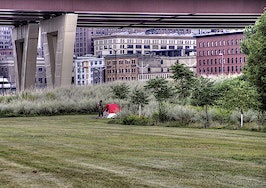Yesterday, I did something I haven’t done in months. I walked two blocks to a store and bought some milk I needed for baking. One of the many things about city life that I miss is walking to a store any old time for just one item.
Cities are the center of the pandemic, just as they’ve been during plagues throughout history. (In fact, it was a pandemic that lead to the invention of the modern-day sewer system.) That history of cities goes back 8,000 to 10,000 years. At one point, humans were nomadic. Then, they discovered farming and began to stay in one place and accumulate stuff. Some became real estate agents — and the rest is history.
Throughout the pandemic, I have avoided using the pandemic itself for marketing anything. There will be permanent changes, but I don’t think we’ll see a mass exodus from the cities to the suburbs.
Is it wise to make big changes in our lives because of this pandemic? Will the people who leave the city be happy with their choice five years from now? Are there hazards of living in the suburbs that people don’t consider? Is this really the best time to move?
Shortly after the civil unrest this spring, I got a call from one of my past clients who wanted to talk about moving to the suburbs. They need more space for distance learning and working from home, and wish to be far away from any future civil unrest.
They want a bigger yard for the kids. Prior to the pandemic, the kids were all over the neighborhood and took full advantage of the large park just down the road. They also enjoyed playing in the street and riding their bikes.
The family is looking to change their lifestyle to accommodate having to stay home because of COVID-19. They view their jobs and working from home as a permanent situation. It doesn’t matter that they will be farther from school because of distance learning. There really isn’t any point in living in any particular area if the plan is to mostly stay indoors. Some people just want to stay at home.
They moved to the neighborhood a few years ago, and it took them forever to find the perfect home. They loved the neighborhood with all of its amenities. They’ve always lived in the city, but for them, the pandemic made the city unlivable in three short months.
Maybe the suburbs are safer depending upon what a person is afraid of and what they consider too dangerous to live near. The pandemic has been good for marketing the suburbs where the houses are large and farther apart, and the lots are bigger.
In the city, things are different now. Many businesses are still closed, and there are vacant storefronts again just like there were during the Great Recession. There’s vacant office space, and the small businesses that were supported by office workers are starting to close permanently.
There’s a little more traffic now that the breweries and taprooms have reopened. Some of the restaurants reopened with outdoor dining and even some indoor options, too. During the evening hours, it almost looks like 2019 — except without sports and concerts.
The local businesses, sports arenas, libraries, theaters and mass transit are some of the amenities that attract people to the city and to our downtown area. Most have been closed for months. The light rail is running, but there aren’t many riders. The riders are either working from home or have been laid off.
Condo owners I’ve talked to are looking for more space and living situations that make it easy to stay away from people. They no longer use the exercise room, the pool or any of the public amenities in the building, and the coffee shop in the lobby has been closed for months.
There are buyers for the condos. Sometimes, they are people who’re moving to the city to be closer to jobs even though they mostly work from home. Some were renters in nearby apartment buildings.
Local Realtors working downtown are really promoting the rooftop gardens, courtyards and private balconies. In the winter, those amenities won’t be as useful, but they will still attract buyers. They always have.
The city isn’t as attractive as it was six months ago, especially in areas where there has been civil unrest. There are still boarded-up buildings and not as many small shops open. It’s easy to promote the idea of homeownership, and that’s what I try to stay focused on.
The pandemic will be an obstacle for all of us for another year or so. I don’t think wearing masks and avoiding others is going to be a permanent way of life that we need to plan around.
Even though it’s hard to market city life right now, it isn’t hard to market real estate in the city. The demand is greater than the supply, and prices are still rising.
Historically, cites have been the center for commerce and for the arts. They have been vibrant places that attracted young people. They are places with opportunities, jobs and nightlife, and maybe places to meet someone special.
Once the pandemic is under control, and there’s a vaccine, there will be new business opportunities in the city. There will be a renaissance. We may see big changes in local zoning laws and maybe a way to build new affordable housing. Most of the population of this planet live in cities and will continue to do so.
Teresa Boardman is a Realtor and broker/owner of Boardman Realty in St. Paul. She is also the founder of StPaulRealEstateBlog.com.













